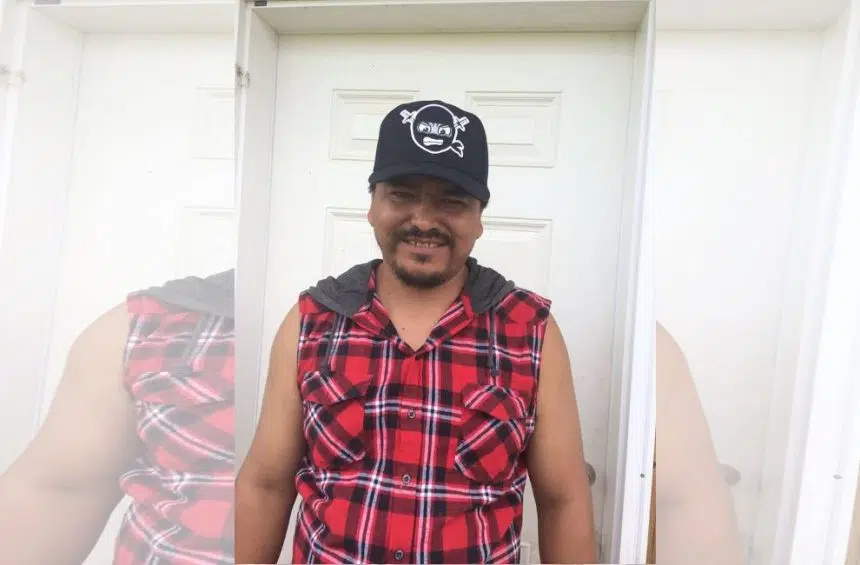Giselle Thomas wants to see change in First Nations communities after alleging her older brother was mauled to death by two dogs.
Thomas and her brother, Noel, are both from Witchekan Lake First Nation. She said her brother was working to help clean up yards and the community.
“He was really helpful that way, always wanting to help people around the community, and he loved being around people and family,” she said.
That’s what Noel, 43, was doing when he died on June 1. A family living near him had asked if he would cut their lawn. He agreed.
Thomas said the family has two pitbulls, which have been a problem in the community before.
When she found her brother, Thomas said Noel was unconscious, laying on the ground, with blood filling his pants and surrounding his body.
Thomas said she performed CPR on her brother for more than a half-hour before help arrived.
She put a tourniquet on his leg and pressure on his hands, both of which she said were injured.
“When I was performing CPR on him, I could slowly see him slipping away,” she said. “His eyes were rolling back.”
The tragedy isn’t something she thought she’d ever experience.
“It’s shocking, a vicious attack like that,” she said.
Thomas isn’t surprised at the incident itself, however. She said large populations of dogs run wild in many First Nations communities, hers included.
Thomas said she hears about people getting attacked by dogs in their community “on a daily basis,” but her community doesn’t have any laws or bylaws surrounding dog ownership and control.
Without those laws, Thomas said the RCMP is not able to restrict any animals on the reserve.
“A person can get attacked on reserve and nothing will be done,” she said. “You can get viciously attacked by a dog, and there’s nothing you can do about it.
“(The dog owners) knew very well that those dogs were vicious, vicious dogs, and they still invited people, like practically begging people to come into their environment.”
Thomas said now that dogs have taken a life, it’s past time to make a change. But she said she fears that won’t happen, because many people in her community don’t see a problem with dogs.
“When is enough enough?” she asked. “We need justice for my brother.”
Seeking change
If her community’s chief and council aren’t able to implement any bylaws to help stem the problem, Thomas said she wants to see the federal government step in.
She also wants to see the dog owners held responsible and criminally charged in her brother’s death.
“That’s setting an example to the rest of the pitbull owners all across Canada,” she said.
The Saskatchewan RCMP reported that Spiritwood officers “assisted at a non-suspicious sudden death investigation on Witchekan Lake First Nation” on June 1. The RCMP clarified that a non-suspicious death is where the RCMP assists the Saskatchewan Coroner’s Service because “criminality is not suspected.”
The investigation is now in the hands of the Saskatchewan Coroner’s Service. That office said it’s continuing to investigate, and a post-mortem examination has been completed.
Results will be available, they said, in “approximately four to six months.”
Both the RCMP and coroner’s service said no further information will be released until after the investigation has been concluded.
650 CKOM has reached out to Witchekan Lake First Nation for comment.
Thomas said she understands many people want to keep pitbulls as pets, but she wants to see them properly cared for and restrained to protect others.
“If they’re not going to lay charges on the owners, then what?” Thomas said, adding she’s worried about the next attack that could happen in her community.
Noel’s Law
Thomas said her brother leaves behind an 18-year-old son, who was devastated to have lost his father.
Noel, she said, lived in the Witchekan Lake First Nation community his whole life.
“He had a really beautiful way of looking at life,” she said. “He made the best of every day.”
Thomas said her brother loved dogs. He had three of his own and often took in strays. Noel didn’t believe in turning dogs away, she said.
“The whole community of dogs would come running and he would feed them all,” Thomas remembered.
Thomas said her goal is for Noel’s death to lead to some positive change, ideally in the form of a bylaw named after him that would keep both dogs and people safe in the community he loved.







